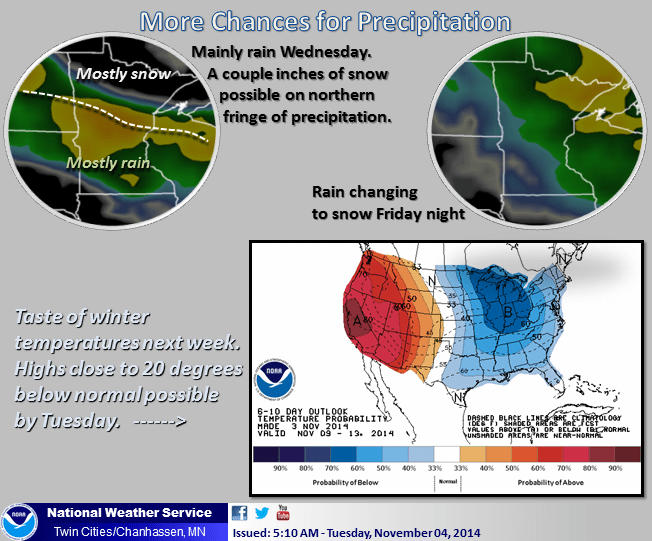Favorable Election Day, wintry preview ahead

Go Deeper.
Create an account or log in to save stories.
Like this?
Thanks for liking this story! We have added it to a list of your favorite stories.
Imagine if we voted for the weather forecast.
Sunny mild weekends with all the rain falling on weekday nights? A landslide for milder winters? Candidates running on a platform of perfect weather for all major holidays?
I can just hear the hard line weather candidate's pitch.
Turn Up Your Support
MPR News helps you turn down the noise and build shared understanding. Turn up your support for this public resource and keep trusted journalism accessible to all.
"I approved this ad, because our grandchildren need to know what it was like to walk two miles to school in 5 foot snow drifts."
Thankfully some things are still beyond our control, and the short term weather forecast is one of them.
Minnesota and much of the nation experiences favorable weather today for Election Day 2014. Dry weather conditions may favor high turnout in most key Senate battleground states today. The only exception is Arkansas, where widespread rain is falling.

Have you ever wondered how weather affects elections? The Weather Channel has an interesting piece this week on how weather may affect turnout.
According to polling data from realclearpolitics.com, Senate races in 11 states are either toss-ups or only lean toward either the Republican or Democratic candidate heading into the election.
Research commissioned by The Weather Channel prior to the 2012 Presidential election found clear links between Election Day turnout and bad weather. Among them:
- In bad weather, Republican supporters are more likely to vote.
- Decided voters are almost twice as likely to vote in bad weather as undecided voters.
- Icy roads are the biggest weather impediment to voters age 55 and older, impacting roughly 1 in 8 such voters.
- Those with income levels less than $50,000 a year are less likely to vote on a bad weather day than those making more than $50,000 a year.
November eases in: But can winter be far behind
It's been a spectacular fall in Minnesota. Those of you I've spoken with say this fine extended fall weather has been good tonic for the Minnesota weather psyche that was frayed by a brutal winter and monsoonal spring and early summer.
Yes. we needed this. We've come up for air the past few months. We can take another approaching winter now.
No doubt about it, November is more winter than fall in Minnesota. So it should come as no surprise that the forecast contains words like cold, snow and "arctic outbreak."
Check out some of the Twin Cities averages for November.
50 degrees average high temperature at Minneapolis-St. Paul International Airport on Nov. 1
33 degrees average high tempertaure at MSP on Nov. 30
9.3 inches average November snowfall at MSP
Nov. 18 average first 1 inch snowfall at MSP
Yes, it snows in Minnesota in November. If fact, we average at least two days in November with at least 1 inch of snow in the metro according to the Twin Cities National Weather Service.

Slow slide into winter in the next week?
Wednesday features our first real Alberta clipper zipping through Minnesota. A coating of light snow is quite possible from Bemidji through Brainerd and Duluth and Hinckley.
We may even see a few stray flakes mix in the far north metro early and late Wednesday as the rain-snow line hovers north of the Twin Cities.

Here's a look at the snowfall forecast up north from the Duluth National Weather Service.

Here's the clipper that rides in with a mixed precip bag Wednesday. High pressure returns fair weather by Thursday.

November arctic outbreak this weekend?
All systems appear go for the strongest cold front of the fall season by Saturday.
Two waves of frigid air from inside the Arctic Circle sail south toward Minnesota into early next week. Another clipper sails through with the potential for accumulating snow Sunday ahead of the colder, second arctic style front.
With chilly winds and highs in the 30s this weekend, the change will get your attention. Highs in the metro may not climb out of the upper 20s by next Tuesday.

The National Oceanic and Atmospheric Administration's Climate Prediction Center keeps Minnesota and the eastern United States in the cold zone through Nov. 17. Does this pattern look familiar?

There are some signs temperatures may moderate in late November.
Stay tuned.


